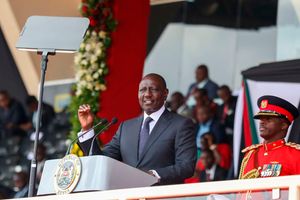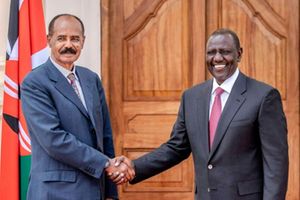
Education CS George Magoha addresses members of the National Commission for Science,Technology and Innovation at Pride Inn Hotel in Mombasa on November 9.
Education
Premium
Scandal of thousands of ghost learners revealed
What you need to know:
- Headteachers and corrupt Education ministry officials inflated enrolment numbers used by the government to disburse funds for Free Primary Education programme.
Currently, the government allocates Sh1,420 per learner.
The ministry set the prices at Sh2,500 and Sh3,800 for primary and secondary school desks respectively. This
Taxpayers have been losing billions of shillings every year funding the ‘education’ of more than half a million ghost learners, Education Cabinet Secretary George Magoha has revealed.
This is after headteachers and corrupt Education ministry officials inflated enrolment numbers used by the government to disburse funds for Free Primary Education (FPE) programme.
In what appears to be reincarnation of FPE scandals that claimed careers of past Education ministers, Prof Magoha says he has uncovered an inflation of the number of primary school children by a staggering 529,997.
The programme has become a minefield that has either claimed careers or tainted the reputations of top ministry figures, who have at one time had to answer questions on theft of FPE funds under their watch.
They include professors George Saitoti, Sam Ongeri, Karega Mutahi and Ayiecho Olweny.
The latest revelation was contained in a statement the CS released on Saturday while defending his abrasive style of management and why it has been effective. According to the CS, the anomaly was unmasked by the task force on implementation of competency-based curriculum that collected data from all learning institutions in the country.
Inflation of numbers
“Due diligence identified an inflation of numbers of learners from 8.47 million to nine million. The shortfall of 529,997 learners has led to the saving of Sh752,594,740 annually,” Prof Magoha said at Ayany Primary School in Kibra.
The FPE programme started in 2003 during President Mwai Kibaki’s regime. Currently, the government allocates Sh1,420 per learner.
It was not immediately clear how much may have lost in the scandal so far because Prof Magoha did not disclose how long the theft has been going on.
While touring schools in Machakos County last Wednesday, the CS had said the ministry now has what he referred to as “virgin data” on schools. “We are no longer wasting Kenya government money using assessed numbers.
“We are paying for a child that is alive, that has been seen and counted,” Prof Magoha said, adding, the task force will complete its work next month.
Curiously, there has been conflicting data from different government sources on enrolment in primary schools, raising questions on its reliability.
Nevertheless, the loss of money is huge considering that there are currently 8.47 million learners, yet according to government records, enrolment in primary schools jumped from 5.9 million to 9.4 million learners between 2003 and 2010.
Economic Survey 2020
Economic Survey 2020 noted there were 10.1 million learners in primary schools in 2019, a number it reports as a decline of 4.5 per cent from the previous year’s 10.5 million. The cause of the decline is not explained.
“The methodology differs from the one employed in 2016 when the last census on basic education was carried out. Consequently, all the previously published data after 2016, including the Sessional Paper No. 1 of 2019 and the National Education Sector Strategic Plan 2018-2022, were based on projections,” reads Basic Education Statistical Booklet that has the latest data.
The Education ministry introduced the National Education Management Information System (Nemis), a web-based data management tool, in 2017 to give up-to-date information on education, but this has faced challenges, especially in primary schools.
Before the introduction of Nemis, headteachers used to manually submit a monthly report of the school enrolment and staffing. They would fill the forms and forward them to the district (and later county) education office for onward transmission to the ministry headquarters.
At the end of last year, Prof Magoha ordered a physical headcount of all learners. And in January this year, he ordered school heads to upload all learners’ data onto the system lest they miss out on government capitation.
Data on 99 per cent of learners in secondary schools have been uploaded onto the platform as they are captured upon entry into Form One. But the taxpayers’ losses do not stop at capitation funds because inaccurate data may also have led to more theft in the central books procurement programme.
A clear indicator of that has been school heads complaining about being supplied with more books than they need.
Desks scandal
One publisher said that, when the programme started in 2018, they were unable to find some of the schools in the list that they received from the ministry — pointing to a high-level scheme to inflate numbers.
The central procurement system was introduced to save government money after spending billions of shillings without achieving the desired 1:1 learner to book ratio. Since its introduction, this has now been achieved in Grade 1, 2, 3 and 4 and is ongoing in other classes.
Prof Magoha also indicated that, initially, ministry officials had inflated the cost of desks in the Sh1.9 billion desks project, which would have resulted in less desks delivered to schools.
“I tasked one of the units in the ministry to develop and cost a prototype. When I did due diligence of establishing the market prices of the desks, I realised that the unit at the ministry had inflated the cost by Sh1,700, which means only 250,000 desks would have been supplied.”
The ministry set the prices at Sh2,500 and Sh3,800 for primary and secondary school desks respectively. This, he said, increased the figure of the desks to be supplied to 622,157.
The ministry seems to have a problem with fudging data, for a few months ago when the government stepped in to pay salaries for teachers employed by boards of management, there was a delay after principals were accused of giving inaccurate data in order to steal the money.
The ministry again had to resort to a manual count before disbursing the money.
In 2016, the Ethics and Anti-Corruption Commission handed over a report to then Education CS Fred Matiang’i on how school heads inflate enrolment figures and also misappropriate the capitation funds sent to schools.





